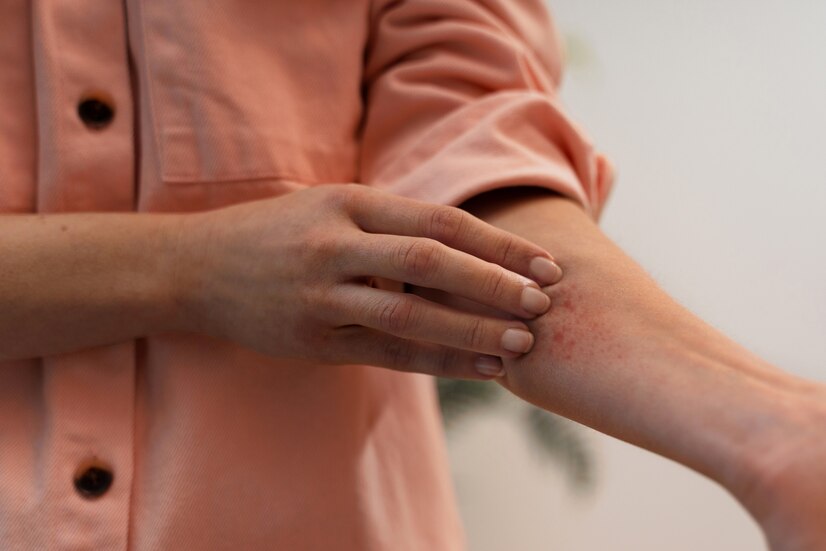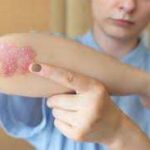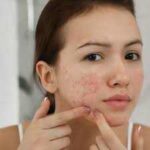Does your skin become inflamed, itchy, or irritated? These symptoms are associated with the condition known as dermatitis. Read this blog to learn more about different types, common symptoms, and various dermatitis treatment.
What is Dermatitis?
Dermatitis is a broad term that is used to describe a number of skin conditions characterised by inflammation, each of which has its own signs, symptoms, and triggers. It includes a variety of skin irritations and rashes that result from numerous factors, such as irritants, genetic factors, allergic reactions, and other underlying conditions.
It is not a contagious condition, which means it cannot spread from person to person by direct contact. However, there are certain dermatitis, like contact dermatitis, that may indirectly transmit the condition through contact with contaminated objects or surfaces. This skin condition can cause the person’s skin to become red, swollen, and itchy.
Signs and Symptoms of Dermatitis

The signs and symptoms of dermatitis usually vary and depend on the condition. Here are some of the common symptoms of dermatitis:
- Itchiness that can be painful
- Dry, cracked, or scaly skin
- Blistering with oozing and crusting
- Skin becomes cracked or develops open spores.
- Chronic scratching or rubbing of the skin
- Thickened and hardened skin
- Small raised bumps typically appear on brown or black skin.
If you’re experiencing any of the symptoms associated with dermatitis, you can consult your doctor to get treatment options based on your condition.
Dermatitis Treatment: What Are the Different Types of Dermatitis?
There are different types of dermatitis; each has its own set of characteristics, symptoms, and triggers. Below are some of the types of dermatitis.
- Contact Dermatitis
Contact dermatitis usually occurs when your skin reacts to an allergen or irritant in your environment. When any substance comes into contact with your skin and then leads to an adverse reaction, this condition is known as contact dermatitis. It can cause your skin redness, itching, swelling, and even blistering in some conditions.

- Atopic Dermatitis
It is a chronic skin disorder that causes the skin to become dry, itchy, cracked, and inflamed. Atopic dermatitis is the most common condition of eczema that usually occurs on the face, arms, and legs.
It is believed to be caused by a combination of genetic factors, environmental triggers, and immune system factors. Symptoms of atopic dermatitis include dry or scaly skin, skin discolourations, or changes in pigmentation.
- Seborrhoeic Dermatitis
Seborrhoeic dermatitis is a non-contagious skin condition that causes itchy red patches and grey scales on your skin and white powdery flakes on your scalp.
This type of dermatitis affects areas of the skin that are rich in oil glands, including the face, scalp, and upper chest. It occurs most often in infants younger than three months old and in adults aged 30 to 60.

There is no exact cause of seborrhoeic dermatitis; however, it is believed to be caused by a combination of factors such as Malassezia yeast overgrowth, excessive sebum production, and environmental and lifestyle factors.
Dermatitis Treatment: How to Manage Dermatitis Effectively?
Dermatitis treatment with the help of Ayurveda involves a holistic approach that focuses on restoring balance to the body and mind.
Here are some of the ways in which dermatitis can be managed.
- Maintain a balanced diet
Having a balanced diet is essential for overall health and managing dermatitis. You can include fresh vegetables and fruits and must avoid processed foods, dairy products, and gluten that may trigger the condition.
- Herbal remedies

Herbs such as neem, aloe vera, turmeric, and sandalwood are rich in inflammatory and antibacterial properties, making them effective in managing dermatitis-related symptoms.
- Panchakarma
It is an ayurvedic therapy that involves removing toxins from the body and balancing the doshas. It helps in managing the dermatitis by addressing the root cause of the problem.
- Lifestyle modifications
To manage dermatitis, you have to make certain lifestyle modifications, such as avoiding stress, as it may trigger the condition. You can easily manage stress by including yoga, meditation, and breathing exercises in your daily routine.
CONCLUSION
A person living with dermatitis can be challenging as it causes discomfort, itching, and irritation. There are various effective ways to manage the dermatitis condition, such as panchakarma, lifestyle changes, dietary modifications, and herbs including neem, aloe vera, and turmeric.
To get the right treatments and therapy for your type of dermatitis, it is essential to consult Ayursparsh Clinic & Panchakarma Center. It is a renowned wellness center in Dharwad, Karnataka, for treating a variety of skin conditions.
Reach out to Dr. Rashmi C. Patil, MD (Ayu), to get better treatment options that suit you well.




